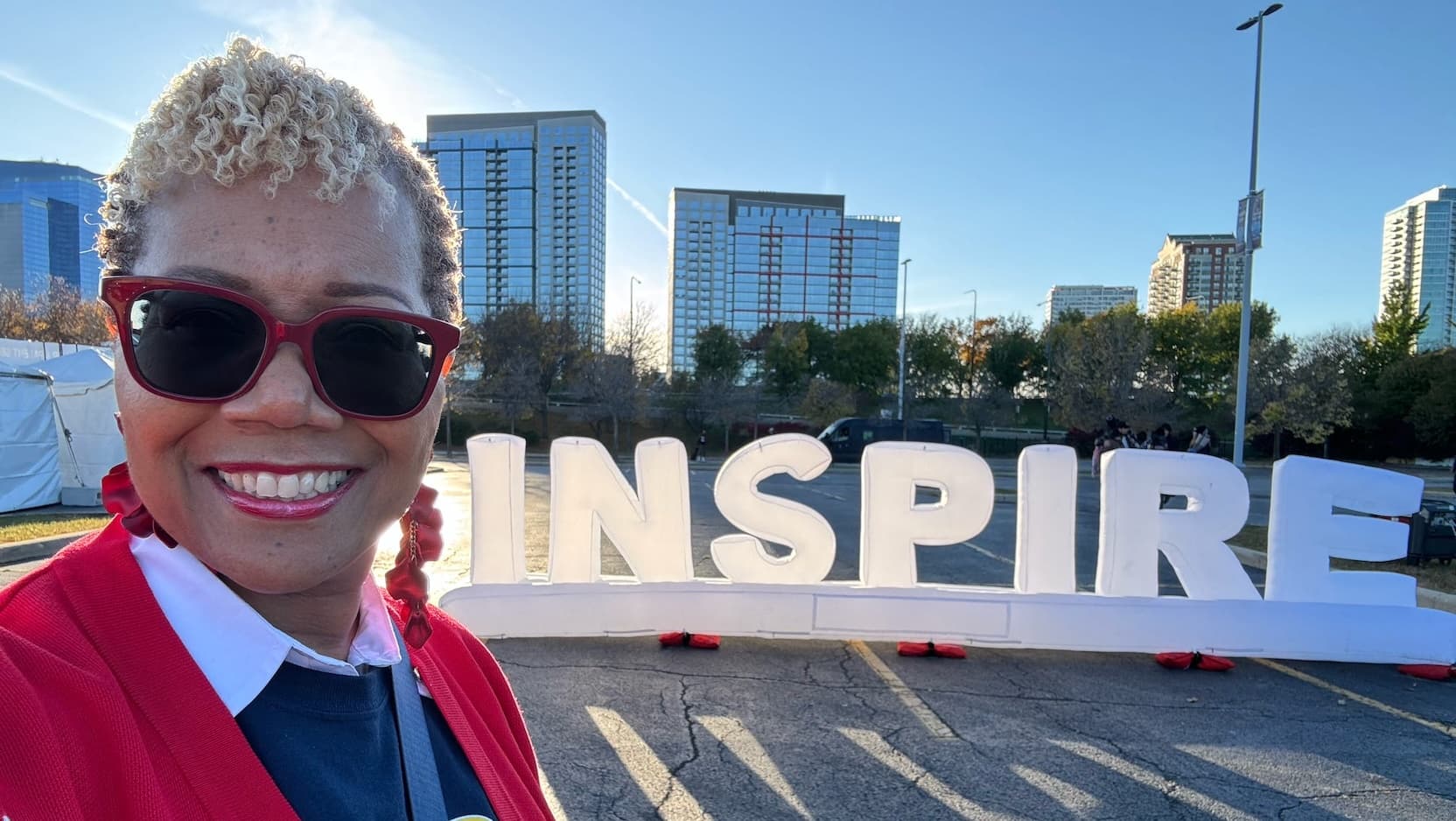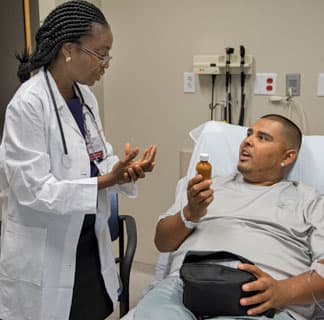Cancer survivor encourages Black patients to enroll in clinical trials

Raised in a Christian home by a single mother, Lisa Howard always helped others in her South Side community. Even when she was diagnosed with cancer, she continued to help by enrolling in a clinical trial as part of her treatment at the University of Chicago Medicine.
“Participating in this clinical trial was something I knew was lifesaving and life-changing for me, especially knowing that clinical trials get a really bad rap in the African-American culture,” she said. “I knew that I had to do this.”
The clinical trial led Howard down a path of serving as a patient advocate that would allow her to help others.
Fatigue, followed by a cancer diagnosis
In 2013, Howard struggled with such extreme fatigue that it took all her energy just to get her children off to school before needing to go back home and rest. Normally, she was an active stay-at-home mom, but now she was tired and winded all the time.
Knowing something was off, she went to urgent care and was immediately admitted to the hospital because her hemoglobin level was dangerously low — a 4 when it should have been between 12 and 15.
After follow-up tests, Howard was diagnosed with multiple myeloma, a blood cancer that develops in plasma cells in the bone marrow. In healthy bone marrow, normal plasma cells make antibodies to protect the body from infection. In multiple myeloma, plasma cells are transformed into cancerous cells that grow out of control and crowd out normal cells.
Treating multiple myeloma
Soon after her diagnosis, Howard was referred to the internationally recognized multiple myeloma experts at the University of Chicago Medicine Comprehensive Cancer Center. As Howard shared her symptoms, they listened.
"UChicago Medicine who made me feel like it's going to be OK,” she said.
Howard’s cancer treatment would be long and intense: four months of low-dose chemotherapy, a higher dose of chemotherapy, a stem cell transplant, and 15 months of low-dose chemotherapy.
Clinical trial for multiple myeloma patients
The team told Howard she would be a good candidate for a clinical trial for patients newly diagnosed with multiple myeloma.
Treating multiple myeloma successfully often requires several drugs working together. However, in many cases, the multiple myeloma returns. Clinical trials, such as this one, test ways to help newly diagnosed patients achieve long-term remission.
Howard decided to enroll.
“The team made me feel exceptionally comfortable,” she said. “They read through all of the rules, and if I chose to stop the trial at any point, they made sure I understood that it was my choice to do that.”
Using the drug in the clinical study, Howard saw her hemoglobin and blood cell counts increase within a month — half the time it would normally take to achieve such progress.
Howard was closely monitored during the trial and had frequent tests.
“No one loves getting those, but every time I had my blood drawn or a bone marrow biopsy taken, [I knew] it wasn't just for me — it was to help someone else,” she said.
By 2016, her cancer was in remission.
Black representation in clinical trials
Diagnosed at age 45, Howard was young to develop a disease that typically affects people in their 60s. However, multiple myeloma has a higher incidence among African Americans. Black patients are 5 to 10 years younger than white patients when they are diagnosed, according to the Multiple Myeloma Research Foundation.
Multiple myeloma patients who are older, live in a rural area, or are Black and/or Hispanic are generally underrepresented in clinical trials. Representation matters because clinical studies that do not reflect the real-world patient population may not be relevant and applicable to all populations. Increasing representation of underserved populations in multiple myeloma clinical studies benefits both myeloma patients and the wider myeloma community.
“I honestly believe that just participating in that clinical trial saved my life,” Howard said.
“I had to show others that, yes, the past has mistreated us, and there's a lot of medical mistrust that has taken place. However, we're moving forward with new options and new treatments.”
Howard now helps educate the community about multiple myeloma and clinical trials. She’s become the go-to person whenever friends, family members or neighbors are newly diagnosed with cancer.
“I live for that stuff, because I remember what it was like,” she said. “I realized early on that, although it's happening to me, it's not just about me and it's not just for me — it's to be able to learn and to help others as they go through cancer.”
Spreading the word
Howard’s advocacy journey began with simple but powerful conversations. She started informally surveying friends and fellow survivors about clinical trials, and was surprised to find many were unaware of their existence, deeply mistrustful of them or didn’t know how they could benefit future patients in underrepresented communities.
She began tabling in untraditional spaces like local libraries and attending webinars to educate herself more thoroughly. The more she learned, the more committed she became to helping others feel informed and empowered.
Howard also facilitated a discussion at the UChicago Medicine Comprehensive Cancer Center on the book “Between the World and Me” by Ta-Nehisi Coates. She said the discussion opened the door for powerful conversations about the lived experiences of individuals in the Black community navigating systems not built with them in mind and the opportunity to explore how historical trauma, systemic racism and generational mistrust still shape attitudes toward medical research and clinical trials.
“It was impactful to witness the shift from skepticism to a place of cautious engagement,” she said. “The experience reminded me that education and empathy are powerful tools, and it reaffirmed why conversations like this are vital if we want to see meaningful change in representation, research and outcomes.”

Participate in a Cancer Clinical Trial
UChicago Medicine cancer experts are actively conducting clinical trials of new screening methods and treatments for cancer, including breakthrough approaches to harnessing the immune system to fight cancer. As a recognized leader in phase I and other early-phase clinical trials, our physician-scientists are creating new cancer treatment methods that later become the standard of care elsewhere.
Find a cancer clinical trial
UChicago Medicine Comprehensive Cancer Center
UChicago Medicine is designated as a Comprehensive Cancer Center by the National Cancer Institute, the most prestigious recognition possible for a cancer institution. We have more than 200 physicians and scientists dedicated to defeating cancer.
Learn More About the Comprehensive Cancer Center